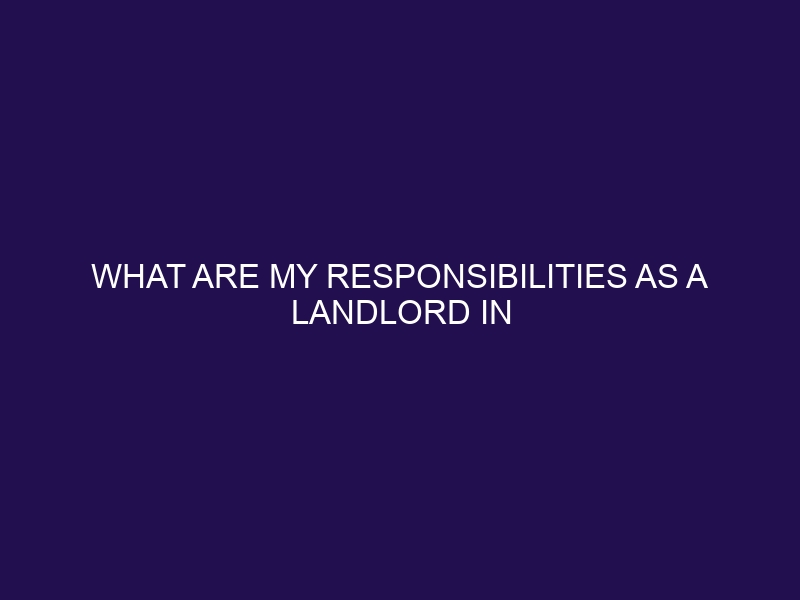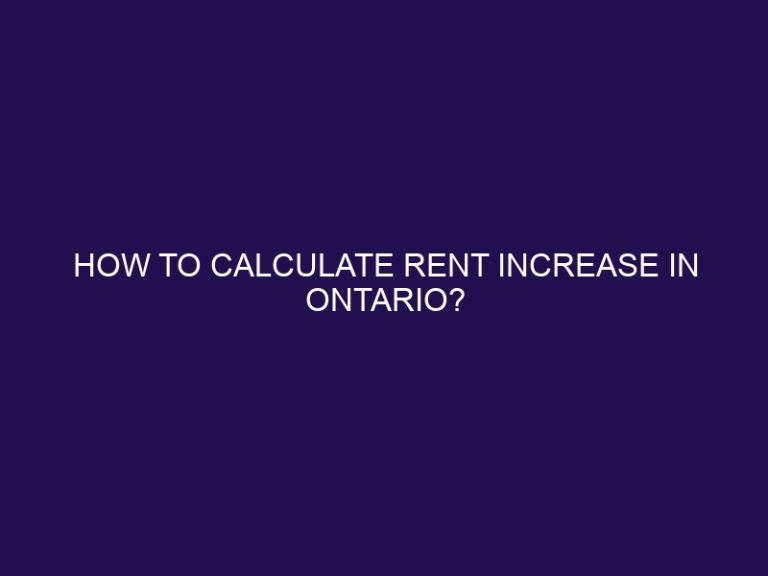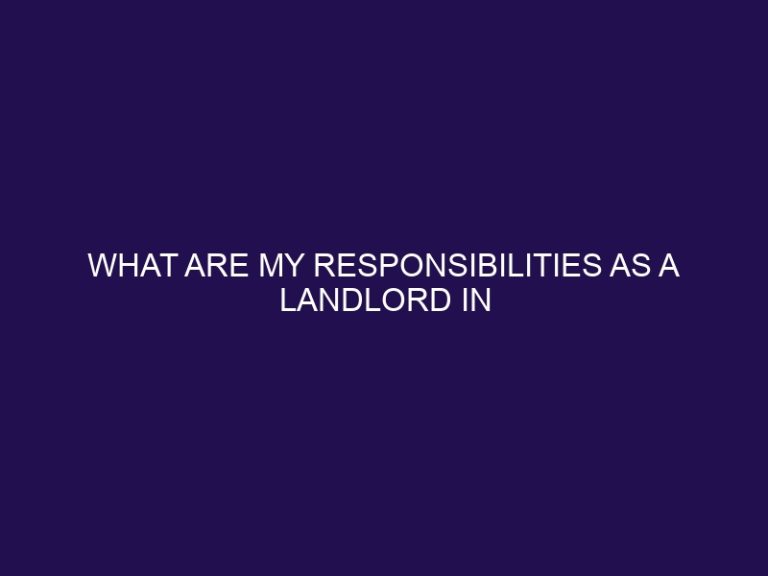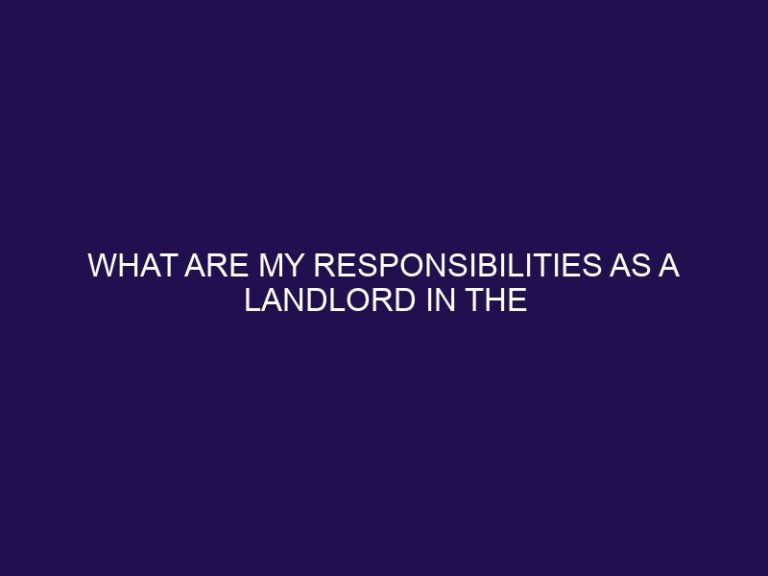What are my responsibilities as a landlord in Ontario?
.jpg)
Understanding Landlord Responsibilities in Ontario is crucial for ensuring a smooth and legal rental experience. The Residential Tenancies Act (RTA) outlines the rights and obligations of landlords and tenants in the province. As a landlord in Ontario, you have specific responsibilities that cover various areas of property management and tenant relations.
Rental Property Maintenance is one key area of responsibility. You must ensure that the property provides a safe and livable environment for tenants. This includes performing regular maintenance and repairs to keep the property in good condition. It also involves handling pest control measures to address any infestations that may arise.
Dealing with Tenant Concerns and Complaints is another important aspect. As a landlord, you are responsible for responding promptly to repair requests from tenants. Respecting tenant privacy rights is essential when entering the property for inspections or repairs. Addressing noise and nuisance complaints in a fair and timely manner helps maintain a peaceful living environment for all.
Collecting and handling rent payments correctly is essential. Setting the rent amount appropriately, providing proper notice for rent increases, accepting rent payments, and providing receipts are all part of this responsibility. handling rent arrears and evictions in compliance with the RTA is crucial when tenants fail to pay their rent or violate the terms of the lease.
Complying with legal requirements is vital to avoid legal issues. This includes obtaining proper licenses and permits for your rental property, meeting health and safety standards, and following anti-discrimination laws to ensure fair treatment of all tenants.
By understanding and fulfilling these responsibilities, you can maintain a smooth and harmonious landlord-tenant relationship while ensuring you are in compliance with the law.
Key takeaways:
- Landlord responsibilities in Ontario include ensuring a safe and livable environment, performing regular maintenance and repairs, and handling pest control.
- Landlords should respond promptly to repair requests, respect tenant privacy rights, and address noise and nuisance complaints.
- Complying with legal requirements as a landlord in Ontario involves obtaining licenses and permits, meeting health and safety standards, and following anti-discrimination laws.
Understanding Landlord Responsibilities in Ontario
As a landlord in Ontario, it is crucial to have a comprehensive understanding of your responsibilities to ensure a smooth and legal renting process. Understanding landlord responsibilities in Ontario is key to establish a successful landlord-tenant relationship.
Some key responsibilities include maintaining the rental property in a safe and habitable condition, complying with building codes and health standards, and respecting tenants’ rights to privacy. It is also important to provide proper notice before entering the rental unit and handle security deposits responsibly.
Additionally, landlords should promptly and fairly address maintenance issues, offer appropriate garbage disposal and recycling options, and adhere to regulations regarding rent increases and lease agreements.
By incorporating these responsibilities, landlords can ensure a safe and pleasant living environment for their tenants while maintaining compliance with Ontario laws.
What Does the Residential Tenancies Act Say?
The Residential Tenancies Act in Ontario outlines the rights and responsibilities of both landlords and tenants. It covers various aspects of renting, including rent increases, maintenance, eviction procedures, and more. Landlords must be familiar with What Does the Residential Tenancies Act Say? this act to ensure that they abide by the law and provide a safe and fair living environment for their tenants. The act also specifies the rights of tenants, such as protection against unlawful eviction and the right to a peaceful enjoyment of the property. Understanding the Residential Tenancies Act is crucial for landlords to maintain a positive landlord-tenant relationship and avoid legal issues.
Rental Property Maintenance
As a landlord in Ontario, it is crucial to understand your responsibilities when it comes to rental property maintenance. In this section, we will delve into the various aspects of maintaining your rental property. From ensuring a safe and livable environment to performing regular maintenance and repairs, and even handling pest control, we’ll cover it all. So, let’s take a closer look at how you can effectively maintain your property and fulfill your duties as a responsible landlord.
Ensuring a Safe and Livable Environment
Ensuring a Safe and Livable Environment is a vital responsibility of landlords in Ontario. It is crucial to maintain the property’s structural integrity, promptly address safety hazards, and provide basic amenities. Regular plumbing and electrical repairs are essential for maintenance. Moreover, landlords must also take care of pest control to prevent infestations. To create a comfortable living environment, it is important to be proactive in responding to repair requests while respecting tenant privacy rights. Additionally, addressing noise and nuisance complaints helps to maintain a peaceful atmosphere. Here’s a pro-tip: Conduct regular inspections to identify and resolve potential issues before they escalate. This demonstrates your commitment to ensuring a safe and livable space for your tenants.
Performing Regular Maintenance and Repairs
Performing regular maintenance and repairs is a crucial responsibility for landlords in Ontario. Here are some steps to ensure a well-maintained rental property:
- Inspect the property regularly to identify any maintenance issues.
- Address repair requests promptly and efficiently.
- Maintain the property’s structural integrity by fixing any damages or wear and tear.
- Regularly service and maintain the property’s major systems, such as HVAC, plumbing, and electrical.
- Keep the property safe by ensuring proper functioning of locks, smoke detectors, and fire extinguishers.
- Address any pest or infestation problems in a timely manner.
- Perform routine cleaning and upkeep to maintain the property’s cleanliness and appeal.
- Prepare for seasonal maintenance tasks, such as snow removal or gutter cleaning.
By regularly performing maintenance and repairs, landlords can provide a safe and comfortable living environment for their tenants while also protecting the value of their investment property.
Handling Pest Control
Pest control is an important responsibility for landlords in Ontario. Handling pest control effectively in rental properties involves several steps. Here are some guidelines to follow:
- Regular inspections: Conduct routine inspections to identify any signs of pests while handling pest control.
- Preventative measures: Implement measures, such as sealing cracks and crevices, to prevent pests from entering the property and effectively handle pest control.
- Professional extermination: In case pests are present, it is crucial to hire a licensed pest control professional to assess and treat the infestation effectively.
- Tenant cooperation: Educate tenants about their responsibilities in maintaining a clean and pest-free living environment as part of handling pest control.
- Documentation: Document all pest control efforts, including inspections, treatments, and tenant communication to effectively handle pest control.
- Follow-up: After treatment, closely monitor the property to ensure the effectiveness of the pest control measures in handling pest control.
Taking proactive steps and addressing pest issues promptly while handling pest control can help landlords maintain a healthy and comfortable living environment for their tenants.
Dealing with Tenant Concerns and Complaints
When it comes to being a landlord in Ontario, dealing with tenant concerns and complaints is an essential part of the job. In this section, we’ll navigate through ways to address these issues head-on. From responding promptly to repair requests to respecting tenant privacy rights, we’ll explore the best practices to create a harmonious living environment. We’ll also tackle the challenges associated with addressing noise and nuisance complaints, ensuring a peaceful and enjoyable rental experience for all parties involved.
Responding Promptly to Repair Requests
“`
As a landlord in Ontario, it is crucial to respond promptly to repair requests from your tenants. This not only ensures their safety and well-being but also helps maintain a positive landlord-tenant relationship. Here are some key points to consider:
- Timely response: The Residential Tenancies Act requires landlords to address repair requests within a reasonable timeframe.
- Effective communication: Maintain open lines of communication with tenants to promptly assess and address their repair needs.
- Qualified professionals: Engage skilled and licensed contractors or maintenance personnel to carry out repairs and ensure quality work.
- Documentation: Maintain records of repair requests, communication, and completed repairs for future reference and legal compliance.
- Regular maintenance: Implement proactive maintenance measures to prevent potential issues and minimize the need for emergency repairs.
Respecting Tenant Privacy Rights
Respecting tenant privacy rights is of utmost importance for landlords in Ontario. It is crucial to prioritize the maintenance of tenants’ privacy by refraining from entering their rental unit without giving proper notice, unless it is an emergency situation. Landlords should diligently conduct regular inspections and repairs while always respecting the privacy of their tenants. It is essential to inform tenants in advance about any upcoming visits or inspections in order to honor and protect their privacy rights. Moreover, landlords must handle all tenant information with utmost care and ensure its strict confidentiality. Adhering to these essential guidelines not only fosters a positive landlord-tenant relationship but also cultivates trust and respect between both parties.
Addressing Noise and Nuisance Complaints
Addressing Noise and Nuisance Complaints is a crucial responsibility for landlords in Ontario. To effectively handle these issues, landlords can follow these steps:
To maintain a peaceful living environment, landlords must address noise and nuisance complaints promptly. Effective communication and enforcement of rules are key factors in resolving these issues.
Collecting and Handling Rent Payments
Collecting and handling rent payments can be a challenging aspect of being a landlord in Ontario. From setting the rent amount to dealing with rent arrears and evictions, this crucial section delves into the responsibilities and best practices involved. Learn how to provide proper notice for rent increases, accept rent payments, and provide receipts in a seamless manner. Stay informed on the rules and regulations that govern rent collection to ensure a smooth rental process.
Setting the Rent Amount
Setting the rent amount as a landlord in Ontario involves a careful consideration of various factors, including market conditions and property expenses. Here are some steps to follow when determining the rent amount:
- Research the local rental market to understand the average rent for similar properties.
- Evaluate the unique features and amenities of your property that may justify a higher rent.
- Calculate your expenses, including mortgage payments, property taxes, insurance, and maintenance costs.
- Consider the demand for rental properties in the area and adjust the rent accordingly.
- Balance the need for profitability with the goal of attracting reliable and long-term tenants.
- Review the Residential Tenancies Act to ensure compliance with regulations regarding rent increases.
By following these steps, landlords can set a fair and competitive rent amount that aligns with market conditions while considering their property expenses.
Providing Proper Notice for Rent Increases
Providing proper notice for rent increases is an important responsibility for landlords in Ontario.
- Review the Residential Tenancies Act to understand the rules and regulations for rent increases.
- Give the tenant at least 90 days written notice before the date the increase will take effect.
- Include the specific details of the rent increase in the notice, such as the new rent amount and the effective date.
- Ensure the notice is served to the tenant properly, either by delivering it in person or sending it by registered mail.
- Keep a copy of the notice for your records, including proof of delivery.
Remember, providing proper notice for rent increases is not only a legal requirement but also helps maintain a good relationship with your tenants.
Providing proper notice for rent increases is an important responsibility for landlords in Ontario. It is crucial to review the Residential Tenancies Act to fully understand the rules and regulations surrounding rent increases. To comply with the law, give your tenant a written notice at least 90 days before the effective date of the increase. The notice should accurately outline the specific details of the rent increase, including the new rent amount and the date it will take effect. It is essential to serve the notice to the tenant properly, either through personal delivery or registered mail. Additionally, retain a copy of the notice and any evidence of delivery for your records. Remember, fulfilling this requirement not only conforms to legal obligations but also fosters a positive relationship with your tenants.
Accepting Rent Payments and Providing Receipts
Accepting rent payments and providing receipts are vital responsibilities for landlords in Ontario. Here are the steps to follow:
- Effectively communicate the acceptable forms of payment, such as checks, money orders, or electronic transfers.
- Ensure tenants receive a receipt for each rent payment made, including the date, amount, and method of payment.
- Maintain a record of all rent payments and receipts for your own records.
- Make sure that receipts are promptly provided, either at the time of payment or within a reasonable period thereafter.
- Ensure that receipts are legible and clear, containing your contact information and any relevant lease details.
Handling Rent Arrears and Evictions
- Handling Rent Arrears and Evictions is an important responsibility for landlords in Ontario. Here are some steps to follow:
- Communicate with the tenant: Reach out to the tenant to discuss the overdue rent and try to understand their situation.
- Issue a Notice of Termination for Non-Payment: If the tenant fails to pay the rent, serve them with a Notice of Termination for Non-Payment, specifying the amount owed and the deadline for payment.
- File an Application to the Landlord and Tenant Board: If the tenant still doesn’t pay, file an application with the Landlord and Tenant Board to obtain an eviction order.
- Attend the Hearing: Attend the hearing at the Landlord and Tenant Board and present your case, providing evidence of the unpaid rent.
- Collecting Rent Arrears: If the eviction order is granted, you can pursue collecting the rent arrears through small claims court or using other legal methods.
Complying with Legal Requirements
When it comes to being a landlord in Ontario, it’s crucial to understand and comply with the legal requirements. In this section, we’ll explore how you can navigate the complex landscape of regulations and obligations. From obtaining the necessary licenses and permits to ensuring you meet health and safety standards, we’ll cover it all. We’ll delve into the importance of following anti-discrimination laws, providing you with the essential knowledge to be a responsible and law-abiding landlord.
Obtaining Proper Licenses and Permits
Obtaining proper licenses and permits is essential for landlords in Ontario to ensure they are legally operating their rental properties and complying with regulations.
- Research: To begin, familiarize yourself naturally with the specific licenses and permits required for your type of rental property in Ontario.
- Documentation: Next, gather naturally all necessary documents and information required for the application process.
- Application: Accurately complete the application forms and naturally provide any additional documentation as requested.
- Fee Payment: Naturally pay the required fees for the licenses and permits you are applying for.
- Inspections: Properly prepare your property for any required inspections by ensuring it naturally meets all relevant safety and health standards.
- Review Process: Allow sufficient time for the authorities to review your application and conduct any necessary background checks naturally.
Remember, obtaining proper licenses and permits not only ensures compliance with the law but also provides peace of mind to both landlords and tenants.
Meeting Health and Safety Standards
Meeting health and safety standards is of utmost importance for landlords in Ontario to guarantee the well-being of their tenants and compliance with legal requirements. It is essential to conduct regular inspections of the rental property in order to identify any potential health and safety hazards. In addition, maintaining cleanliness is crucial to keep the property free from pests or mold, thereby preventing health issues. Landlords must also prioritize the security of electrical systems, ensuring proper installation and maintenance to mitigate the risks of electrical hazards. Implementing fire safety measures such as installing smoke detectors, fire extinguishers, and carbon monoxide detectors is necessary to safeguard the tenants in case of emergencies. Adequate ventilation must be maintained within the property to prevent the accumulation of harmful substances like mold or carbon monoxide. Moreover, access to clean and safe drinking water should be ensured by regularly testing the water quality and promptly addressing any issues that may arise. Lastly, landlords should maintain clear pathways and exits to facilitate safe entry and exit for tenants during emergencies. By incorporating these practices, landlords can effectively meet health and safety standards.
Following Anti-Discrimination Laws
As a landlord in Ontario, it is imperative to adhere to the anti-discrimination laws in order to ensure fair and equal treatment of tenants. In this regard, some key responsibilities include:
- – Following the Ontario Human Rights Code, which strictly prohibits any form of discrimination based on characteristics such as race, religion, gender, or disability.
- – Ensuring that all prospective tenants are treated equally and without any bias or prejudice throughout the screening and application process.
- – Providing appropriate accommodations to tenants with disabilities, such as making necessary modifications to the rental unit.
- – Avoiding any discriminatory practices when determining rent amounts or implementing rental policies.
By diligently adhering to these anti-discrimination laws, landlords can create an inclusive and respectful housing environment for all tenants. It is important to remember that treating everyone fairly is not only legally mandated but also contributes to a positive rental experience for all parties involved.
Some Facts About Landlord Responsibilities in Ontario:
- ✅ Landlords in Ontario are responsible for maintaining a safe and clean living environment for their tenants. (Source: Our Team)
- ✅ Landlords must ensure that the building is in good repair and compliant with health, safety, and maintenance standards. (Source: Our Team)
- ✅ Landlords are obligated to provide access to vital services such as hot and cold water, electricity, heat, and fuel. (Source: Our Team)
- ✅ It is the landlord’s responsibility to make necessary repairs in a timely manner as required by the landlord-tenant act in Ontario. (Source: Our Team)
- ✅ Landlords must maintain common areas and remove snow from driveways and walkways. (Source: Our Team)
Frequently Asked Questions
What are the legal responsibilities of a landlord in Ontario?
Landlords in Ontario have several legal responsibilities, including ensuring the rental property is safe, clean, and well-maintained. They must follow building codes, make necessary repairs, and provide essential services like heat, hot and cold water, and good lighting. Landlords must also maintain common areas, comply with health and safety standards, and provide necessary documents to tenants.
What repairs am I responsible for as a landlord in Ontario?
As a landlord in Ontario, you are responsible for making necessary repairs to the rental unit, including electrical, heating, and plumbing systems, appliances, roofs, walls, windows, doors, lighting, locks, patios, and pools. These repairs must be done within a reasonable time as required by the landlord-tenant act in Ontario.
Can tenants sue landlords for not providing habitable living conditions?
Yes, tenants can sue landlords in Ontario if they fail to provide habitable living conditions. Courts may award damages by lowering the rent if landlords do not fulfill their responsibilities to provide a safe and clean living place. Examples of uninhabitable conditions include faulty plumbing or gas systems, broken windows or doors, mold, leaking roofs, and unclean environments.
Are landlords responsible for maintaining common areas in rental properties?
Yes, landlords in Ontario are responsible for maintaining common areas in rental properties. This includes cleaning and ensuring the safety of shared spaces such as hallways and yards. Landlords are also responsible for removing snow from driveways and walkways.
What services must landlords provide to their tenants in Ontario?
Landlords in Ontario must provide access to vital services such as hot and cold water, electricity, heat, and fuel. These services cannot be shut off, even if the tenant has not paid rent. Temporary shut-offs may occur for repair purposes. Landlords and tenants can agree on payment arrangements for these services, either as a standard fee or based on usage.
What documents do landlords need to provide to tenants in Ontario?
Landlords in Ontario are required to provide necessary documents to tenants. These documents include a written tenancy agreement or lease, rent receipts, and information about the rental unit’s past rental history. It is essential to have a signed tenancy agreement or lease, as verbal agreements may not hold up in legal situations.







